China develops Africa both as Plan B for itself and for the world
RN Bhaskar
The future of the world will lie in making Africa grow. That is what China has been doing all along. That is what India should be worried about. If Africa grows and India doesn’t, the latter could get marginalised.
The West has a jaundiced view of the world. It sees countries in black (or coloured) and white. When it wants workers, it welcomes them with great exuberance. When the work gets done, and they are not needed, the West tries to push them away. That is what happened with the Gast-Arbeiter policy that Germany adopted in the post-war period. Similar games have been played by other countries as well. Now, there are sections of German society that does not want immigrants any more.
This is what worries Europe as well. It welcomes Ukrainian refugees with greater acceptance than those from Africa. Never mind the fact that the migrants from Africa are the outcome of the policies both Europe and the US adopted.
The Europeans supported, or silently acquiesced to, US’ moves to decimate the economies of Libya, Iraq, Sudan and many other nations in Africa in the pursuit of its own goals (https://asiaconverge.com/2022/02/ukraine-the-war-that-usa-wants/). However, while the US is far away, and takes no responsibility for the migrant crisis it created, the Europeans have become sitting ducks for refugees from these devastated economies.
In fact, had the Europeans been less imperious, they would have warmed up to the suggestion that Prof. Kishore Mahbubani from the Asia Research Institute made in September 2023. In a talk titled “The Interdependency of the Strategic Situation in the Euro-Atlantic and Indo-Pacific Areas” he said (watch timeline 28:01 to 30:04 at https://www.youtube.com/watch?v=TF3ksZcRa4s) that if the EU wanted to reduce the inflow of migrants, it should focus on redeveloping these countries ravaged by war and civil strife (often provoked by Western nations). If these countries become prosperous, its people will have a reduced compulsion to migrate. Migration is the result of desperation – an attempt to find a better life away from the country in which a person is born and brought up.
Unfortunately, the West let them down, and so has the United Nations (UN).
What the EU and the US have not done, is something that China has taken up admirably well.
As John Hopkins points out (http://www.sais-cari.org/chinese-investment-in-africa) financial flows from China surged from US$75 million in 2003 to US$5 billion in 2021, then dropped to US$1.8 billion in 2022. They peaked in 2008 at US$5.5 billion due to the purchase of 20% of the shares in Standard Bank of South Africa by the Industrial and Commercial Bank of China (ICBC).
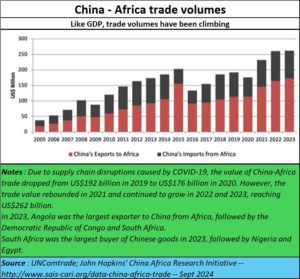 But the quantum of investment flows by themselves may be misleading. GDP continues to grow. So are trade volumes. Moreover, with the infrastructure aiding mineral extraction and transport, both Africa and China have been major beneficiaries of production sharing contracts. China has focussed on both infrastructure and education (including skill development).
But the quantum of investment flows by themselves may be misleading. GDP continues to grow. So are trade volumes. Moreover, with the infrastructure aiding mineral extraction and transport, both Africa and China have been major beneficiaries of production sharing contracts. China has focussed on both infrastructure and education (including skill development).
One more differentiating factor between China from the West is that it does not seek to interfere with the political setup of any of these countries. In that sense, China has been less polemic or intrusive than the US, refusing to enter into games which involve regime change. That makes it more welcome to African nations. And unlike the US, China does not impose obnoxious clauses to trade. Remember the repugnant PL480 clauses India was compelled to sign when it wanted wheat to stave off a famine in this country?
And while, earlier, China ran into the problem of creating debt traps for countries by insisting on a 15-year payback (the financial crisis in Sri Lanka has been well-documented), China quickly revised its approach and worked out longer pay back periods – usually 25 years. In doing so, it became a little more acceptable than the IMF.
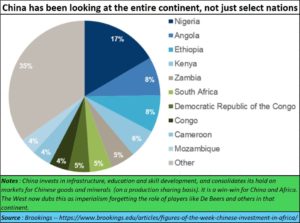 Finally, China has not been looking at just a few countries in Africa. It wants to cover as many countries as possible. That further rives business away from the US and the EU. It makes the sanctions imposed by the US, often unilaterally, a lot less effective.
Finally, China has not been looking at just a few countries in Africa. It wants to cover as many countries as possible. That further rives business away from the US and the EU. It makes the sanctions imposed by the US, often unilaterally, a lot less effective.
Already, the effects are quite visible. China’s GDP has begun to soar.
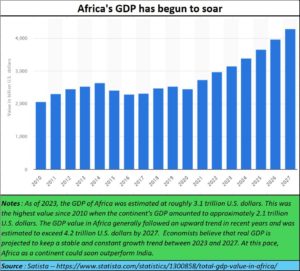 Some of these strategies may be on display when the BRICS summit takes place in the last week of October 2024.
Some of these strategies may be on display when the BRICS summit takes place in the last week of October 2024.
India had a demographic dividend. It may not be able to enjoy it much longer. Already, an estimated 4.3% of India’s population is over 70 years of age. This share is projected to rise to 9.7% by 2050, according to the United Nations.
What is worse is that India has just not focussed either on education (free subscription — https://bhaskarr.substack.com/p/poor-education-will-eventually-damn) or skill development (free subscription — https://bhaskarr.substack.com/p/a-vocational-disaster-in-the-making). Its unemployment rates remain high, among the highest in this region. Medicare facilities are scarce (https://asiaconverge.com/2023/10/medical-education-in-india-is-growing-sicker/). And its policies have been more oriented towards promoting ideologies than economic development.
On the contrary, watch Africa. It has a younger population. It has already begun investing in education and skill development – helped immensely by China.
And what should make India’s policymakers it up is that Africa may benefit from the demographic dividend that was once India’s chest thumping war cry.
Africa has a younger population. It is getting good education and skill development opportunities funded largely by China.
Expect this to translate into a soaring GDP and per capita income growth in the coming years. While Africa is a continent and India a single country, Africa could work together more easily than many other nations have. This is because there is a collective disdain for the West which is seen as an exploiter.
The West had a chance to remedy this, but disdain and racism prevented it from making amends. There was a vacuum, and China stepped in.
None of this has been done with a sense of altruism. China had its own interests in mind as well.
First, it is now being seen as a country that helps finance other developing economies in the most backward regions of the world. Its refusal to get sucked into local politics has endeared it to local governments, especially because it comes with little baggage of racism,
Second, by focussing on Africa, China has secured its access to some of the most prized minerals in the world. Those minerals get African states their share of the money. The exploration and mining of these minerals create jobs. And with infrastructure becoming better, transportation of such minerals becomes easier benefitting both the mining country and China.
China could also be looking to Africa as its Plan B. In case India does not warm up to its desire to work together, China will be willing to wait another 10 years and shift its business to Africa. After all, both India and Africa have almost the same population size today. Africa’s population will become bigger, with the added advantage of youth and education.
If Indian policymakers are smart, they should be moving heaven and earth to improve education, healthcare, and remedy existing flaws in its skill development plans. If they are smart, they should make the business environment friendlier, so that money begins to come in (especially from China).
China does look forward to accessing India’s markets (free subscription — https://bhaskarr.substack.com/p/india-china-and-russia-could-be-dancing). This is more crucial now, since the West has begun to create hurdles in the path of China’s relentless growth. If India does not move quickly, China will not stop growing. Its pace will slow down. But then it will make Africa grow as a huge counter to India.
India is confronted with very stark choices.
It has to stop thinking ideology. It must now focus solely on growth and cooperation with its eastern and northern neighbours.
=================================
Do watch my latest podcast – a conversation with Abizer Diwanji on MSNEs – at https://www.youtube.com/watch?v=kIKhYqKTxbQ
===============================





























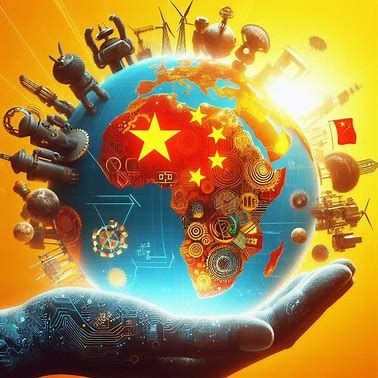
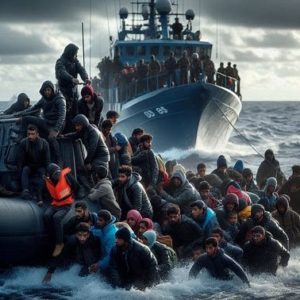
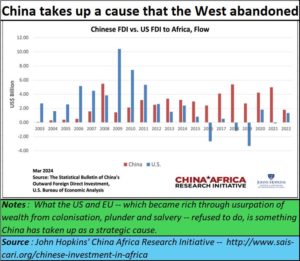
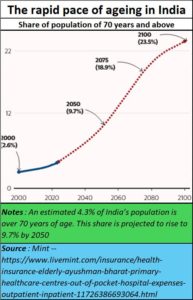
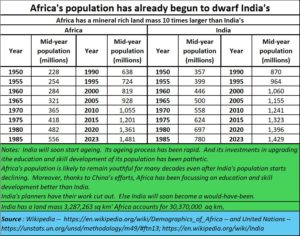








COMMENTS